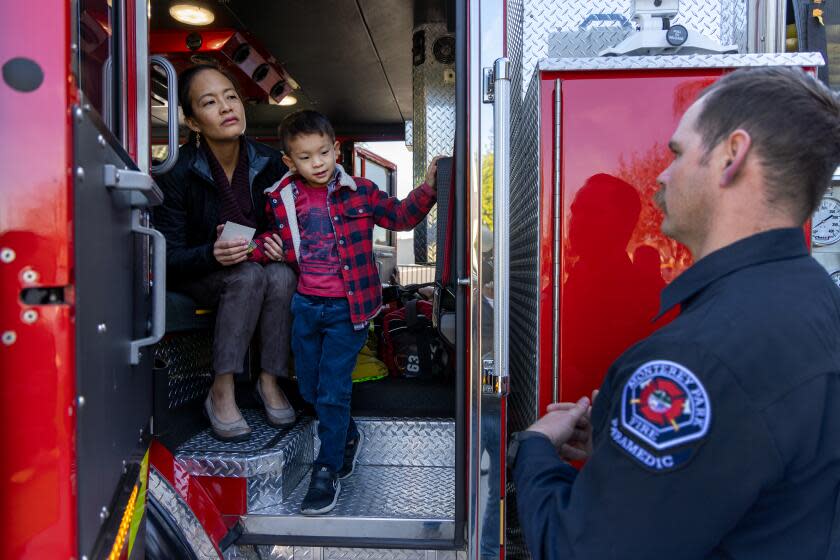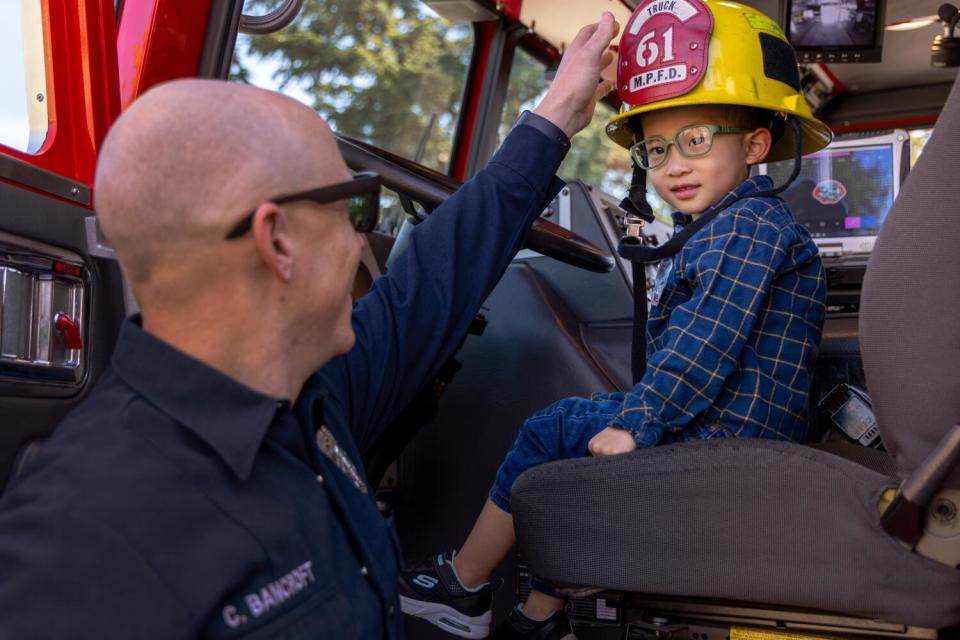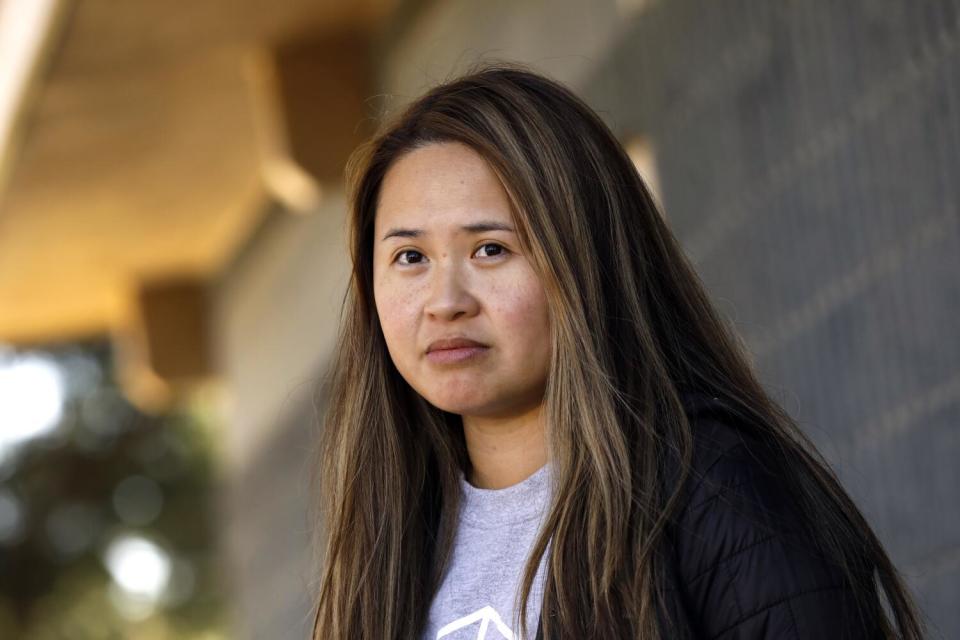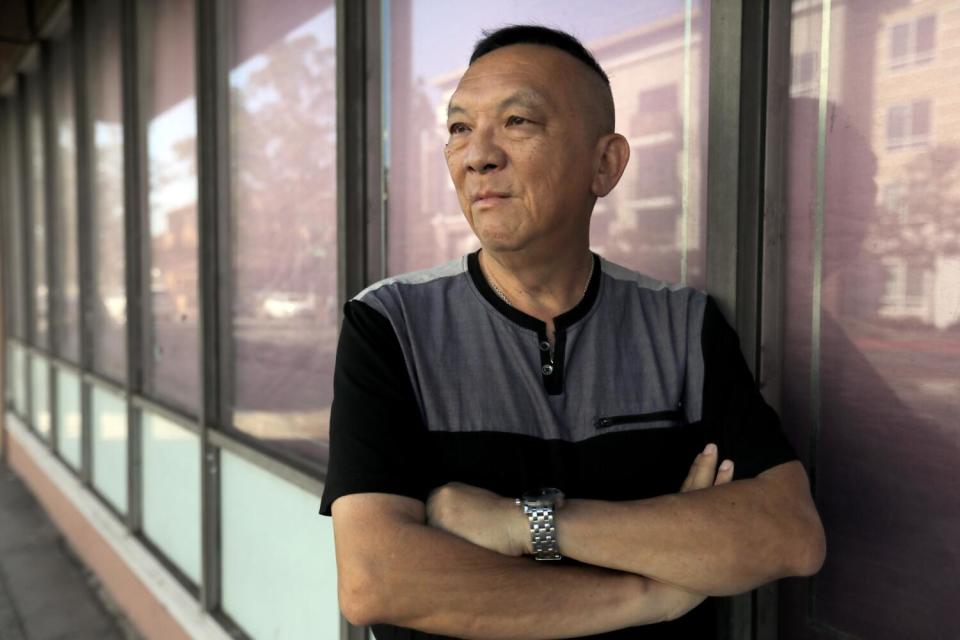Year of grief and healing: Monterey Park shooting survivors, victims' families reflect on trauma

Nearly a year after Ronald Tom's wife was killed in the Monterey Park mass shooting, he and his family visited the local fire station, bearing steamed Chinese buns, to thank the first responders who tended to Diana Tom on that fateful night.
They couldn't save her life but they kept her alive long enough to let her family say their last goodbyes.
"She had a 24-hour window that you gave her because you were there in time that she could be brought to the hospital," Ronald Tom told the group of nearly a dozen firefighters and paramedics. "Four or five of us got to visit her and God bless, she accepted the Lord in her final moments. That was really special."
Nearly a year after the shooting at a popular dance hall during a Lunar New Year celebration, survivors and families of the victims are still grappling with the lingering trauma. To honor their loved ones and cope with their loss, they have created shrines and community support funds, organized dance parties and lobbied for gun control legislation, among other tributes.
The city of Monterey Park is also planning a candlelight vigil on the one-year anniversary of the shooting — Jan. 21 — to honor the victims.
But life will never be the same, not a year later. Maybe not ever.
Lloyd Gock, who formed a support group of survivors, said he told its members — people he considers his second family — that they now have two birthdays: "You have the day you were born and you have Jan. 21, 2023."
For most survivors of a mass shooting, terrorist bombing or other tragedy, anniversaries only revive the pain and reawaken the heartache of lost family and friends. For many, keeping active helps them move forward.
Read more: Healing a shattered community: Monterey Park shooting survivors return to dance
Fonda Quan, the niece of victim Mymy Nhan, 65, who was the first person killed outside Star Ballroom Dance Studio, said her parents went back to their routines. When Nhan was killed, Quan's family was already grieving the loss of Quan's grandmother, who had died a few weeks prior. Nhan had lived with Quan's parents and her death left a void in the home. Eventually, they took up gardening and Quan's mother went line dancing.
“To this day, we’re not done,” Quan said. “I think just that task, the act of occupying their time, helps with the healing and helps make grieving not as hard because they have a filled day to look forward to.”
A year ago, Diana Tom was ringing in the Lunar New Year with her friends at Star Ballroom. She shared a love of the pastime with her late father; the two used to dance together at Star Ballroom and at the nearby Lai Lai Ballroom & Studio several times a week.
As the guests were dancing a line dance at the front of the room, a gunman walked in and opened fire. Eleven people were killed and nine others were injured.
Read more: Three gun control bills inspired by Monterey Park massacre are closer to becoming law
After Tom was wounded in the gunfire, she called her son, Johnathan, from the studio and told him what happened. She sounded alert and seemed more concerned about her friends and everyone else around her than about herself.
The first responders transported the 70-year-old to a local hospital, where her family gathered the next day, both in person and on FaceTime, to say their goodbyes before she passed away.

The death of the family matriarch created an emotional link between her family and the firefighters who treated her.
When the Tom family first visited the fire station a few weeks after the shooting, they thought the firefighters would simply give their condolences. Instead, it was an emotional experience for both sides. The first responders were surprised that the family showed up. Some of them had not yet processed the trauma that they went through.
During a recent visit to the fire station, the firefighters pulled out the firetruck so Tom's three grandchildren could climb around inside and try on the helmets.

"Some of you have memories, saw things, the level of trauma that none of us had and it's very unique," May Tom, Johnathan Tom's wife, told them recently. "I just encourage you all to continue the healing process, whatever that is. For us, connection with you all has really helped us process."
Fire Chief Tom Hallock told the family he was glad that there was a "silver lining" and that they were able to be part of the family's healing process.
"It's not often that we get to see this side of a tragedy," he said. "Often we respond, we do what we do and we come back to the station. For you to share your grief with us and in support of us, it means a lot to me and a lot to them as well."
Read more: After Monterey Park shooting, pastor tried to de-stigmatize therapy for Asian immigrants
Dominic Garcia, one of the firefighters who responded to the Jan. 21 call, said getting to meet the family brought firefighters a "sense of closure."
Also in attendance was Rep. Judy Chu, whose district includes Monterey Park.
“For many victims’ families, it was as if lightning struck,” she said. “They couldn’t believe it. You were able to keep Diana alive so that this family could say their goodbyes, and I think that was just so important for them to be able to have their last moments with her.”
Fonda Quan spent a recent Saturday morning at her aunt's shrine at the Buddhist Xuan Wu Charity temple in Chinatown. A monk was there to do some chanting with the family.
Quan's relatives had flown in from all over the country for the occasion and they decided to celebrate Lunar New Year early by having dinner together.

Since her aunt's death, Quan has been helping organize events and setting up the Mymy Nhan Legacy Fund, a community support fund created in her aunt's honor. The fund helped sponsor a Seniors Fight Back event last month in Monterey Park, which included demonstrations in Mandarin to help seniors defend themselves against violence.
Quan's family also partnered with the Asian Youth Center to launch the Mymy Nhan Memorial Scholarship, which awarded $1,000 each to three high school seniors in the San Gabriel Valley from low-income backgrounds.
“We lost 11 very precious individuals but what we also gained in the last year was something to be proud of, which is we’ve made so many relationships, connected with so many people, and that’s something that will help everyone heal,” she said. “Just being there for each other is most important.”
Gock, who survived the shooting by hiding under a table, helped organize a banquet timed for the one-year anniversary of the tragedy. At least 150 people, including local politicians, are expected to attend. It's meant to serve as a celebration for the group of about 40 survivors of the shooting. Several survivors — the same ones who were dancing a line dance when the shooting began — will perform a similar routine at the dinner.

In the past year, Gock has emerged as one of the more vocal survivors in the group. He has spoken on a congressional panel in Washington, D.C., to lobby for gun control reform, written an op-ed about his desire to destigmatize mental health issues for the Asian American and Pacific Islander community and created a monthly support group for the survivors to jump-start the healing process.
“If you were to sum up this year, I think I’ve aged quite a bit," he said.
Gock's focus, he said, has always been on getting his fellow survivors to open up about their experiences and seek out mental health services to heal from what happened to them. Recently, Gock has scaled back the support group to meeting only every few months. It was never meant to go on forever, he said, but was supposed to serve as a safe space for people to share.
The shooting's biggest impact on Gock, he said, was that he's more isolated than he was before. Although he went back to dancing, Gock doesn't go as often and is more selective about the location.
“There’s still a shadow somewhere for people,” Gock said. “I don’t know if it’ll go away, but I hope so.”
This story originally appeared in Los Angeles Times.


